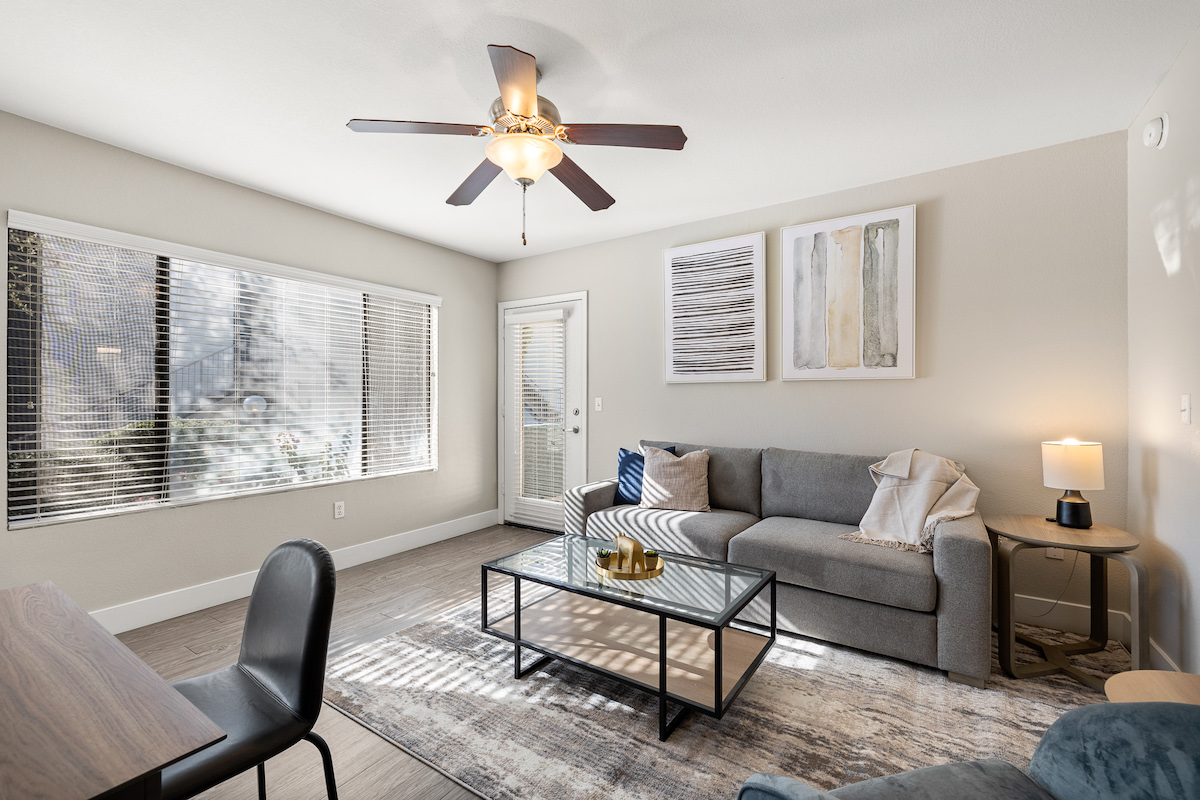
How to Get Out of an Apartment Lease

You’re likely wondering “can you get out of an apartment lease?” There are tons of reasons to get out of an apartment lease: your living situation is unsafe; your landlord is invading your privacy; your job transferred you to a new location. The list is endless.
However, breaking a lease agreement isn’t as easy as giving your landlord the keys and driving off into the sunset. The stress and financial burden of walking out on a lease often can be enough to keep you there.
In a perfect world, you’d be renting a fully furnished apartment with flexible month to month leasing and wouldn’t have to worry about any of this. Unfortunately, most apartments have a year-long lease agreement, at a minimum. But you shouldn’t have to stay in some place you don’t want to be.
If you’re wondering how to get out of an apartment lease, know that you have options.
Landlord-tenant laws
Trying to figure out how to get out of your apartment lease? The first step is looking at your state’s landlord-tenant laws.
Breaking a lease is an action that has consequences. Thankfully, leasing agreements and state landlord-tenant laws outline what your rights are as a tenant, and what penalties you’re up against. To make this process as smooth as possible, you have to know your rights and obligations.
When is it justified to break a lease?
Landlord-tenant laws differ from state to state, but many states allow tenants to leave their lease early without any penalty under certain circumstances. The state of California is a good example of common, justifiable reasons for breaking a lease. Here are the four exceptions that allow moving out before a lease is over, according to legal encyclopedia NOLO:
- Experiencing violence, assault, or abuse
- Entering active military service
- Rental unit violates state health or safety codes
- Landlord harassment or violation of privacy rights
If your reason for breaking a lease isn’t one protected by your specific state laws, you still may be able to. Chances are, however, you’ll be left with an early termination fee. This could be anything from your security deposit to a percentage of your remaining rent, to the entirety of your rent for the remainder of the lease contract.
What happens if I decide to leave anyway?
State laws also determine whether or not your landlord is allowed to hold you accountable for rent if you choose to leave your rental property before your lease is up.
In most places, landlords are required to “mitigate,” or minimize, damages when it comes to early move-out. Obviously, the biggest damage is lost rent, because tenants’ rent is landlords’ income. For a landlord, one renter isn’t necessarily a particularly stressful situation, but for a renter, it can be a huge financial burden.
Landlords who have to re-rent
If you live in a state where landlords are required to make a reasonable effort to re-rent your unit to someone else, you still have to pay the rent in the meantime, even though you’re not living there. So how can you be sure an effort is truly reasonable? If it seems like enough time has passed that someone else should’ve moved in, check up on the following things:
- Are they advertising through multiple platforms?
- Have property showings been happening?
- Is rent the same price it was when you rented or is it suddenly higher?
If the law doesn’t require them to search for a new tenant, there’s a good chance you’ll be stuck paying rent for the remainder of your lease term. At the end of the day, landlords are running a business, and it’s less effort to let you keep paying rent than finding someone to take your place.
Landlords who don’t have to re-rent
In some states, landlords aren’t legally required to make an effort to re-rent your unit, which means there’s a good chance you’ll be stuck paying rent for the remainder of your lease term. Here are the six states where landlords have no duty whatsoever to find a new leaser, as listed by NOLO:
- Arkansas
- Florida
- Minnesota
- Mississippi
- Pennsylvania
- Vermont
Can I just stop paying rent?
If you’re looking for how to get out of an apartment lease, you may reach a breaking point and ask yourself, “What happens if I just move out and stop paying rent on my old apartment?”
So you have an idea of what you’re up against, here are the best and worst things that could happen in this situation:
- Best-case scenario – You lose your security deposit and your credit score takes a hit.
- Worst-case scenario – Your landlord sues you. Chances are, the cost of your legal fees will be much greater than your monthly rent payment during the remainder of your lease—and now, you have to pay both.
Clearly, skipping out on rent isn’t a good way to handle leaving your apartment before your lease is up. But don’t worry, there are other ways to get out of an apartment lease and ease your stress.
3 way to get out of an apartment lease
Even with the best landlord-tenant laws out there, most tenants who break their lease contract end up paying rent at their old place after moving out, at least for a short period of time. Keep reading to figure out how you can get out of an apartment lease and avoid getting stuck.
1. Talk with your landlord
It might seem unlikely, but depending on your relationship with your landlord and the reason you need to break your lease, you may be able to work something out together with minimal complications—and more importantly, no lawyers. You can suggest working together to find a new tenant or setting an agreed-upon fee that’ll let you walk away from your lease with no obligations.
Here are some instances where landlords are more likely to come to an agreement with you:
- Being laid off from work
- Job transfer
- Divorcing tenants
- Serious illness of a tenant or relative
- Death in the family
2. Check for loopholes in your leasing agreement
At the end of the day, your landlord is running a business and you signed an agreement that holds you accountable for decisions that affect their business.
Read over your lease agreement carefully and see if you can find either of these options:
- Look for an opt-out clause – Some lease agreements have an opt-out or early termination clause that allows you to move out early if you pay a certain fee.
- See if you’re allowed to sublease – If your lease allows it, consider subletting. Even if you can’t find someone to pay the full amount of your rent, having someone else cover the majority of it is still much better than taking on the whole amount yourself.
3. Do a full lease takeover
The most foolproof option, but also the most effortful, is to find someone to take over your lease yourself. It’s like subleasing, but you’re eliminating the middleman—you. You’re only responsible for paying your rent until someone else takes your place, so the best thing to do is to find a new tenant on your own, and then present the idea to your landlord.
Here are some ways to find a prospective tenant:
- Clean your place, take some photos, and upload them onto Craigslist, Facebook Marketplace, and other social media.
- Ask family, friends, and coworkers if they know of anyone looking for a place to live.
- Use your community’s social media platforms. If you’re involved in or live near a college or university, make a listing on the school’s off-campus housing site, or post on your neighborhood’s social media pages.
- Go old-school—create an advertisement (or print out one of your online listings) to hang up in coffee shops, on bulletin boards around the city, or in the lobby of your building.
Compare your options
If you’re searching for how to get out of an apartment lease, coming to an agreement with your landlord or making use of an opt-out clause are great options if you’re on a time crunch, but result in extra fees.
Subleasing may prove to be a cheaper option, but your rental company may charge you a subletting fee. Not to mention, you might have to split a portion of rent with your subleaser or sublease multiple times to cover the whole remainder of your lease term.
Finding someone to take over the entirety of your lease is the best option for most people, as long as you start looking for a replacement early. If you find someone before you move out, you will walk away without losing any money—and that’s the goal, isn’t it?
Live on your own terms with Landing
Even if you find a cost-effective way to do it, breaking a lease is taxing. But sometimes, it’s the only choice you have. Chances are, you’re breaking your lease because of something stressful in your own life, and having to worry about your lease, finding a new home, and the process of moving on top of everything else can be really overwhelming.
With Landing, you can eliminate your apartment-hunting stress thanks to the following:
- Furnished units – Fully-stocked with furniture, appliances, and luxury linens, you don’t need to move anything but the necessities. Sell what you can to your landlord, incoming tenant, or neighbor, and you’ll be on your way.
- Instant approval – Unlike regular leases, you’re approved within seconds and can get the keys to your new place in just three days.
- Flexible leasing – Month-to-month leasing gives you a place to call home without any commitment. You won’t have to worry about your credit score or financial penalties ever again.
For people trying to get out of an apartment lease, the quicker the turnaround the better. Make this process easier on yourself by picking a move-in ready apartment. Whether you need furnished apartments in San Francisco or furnished apartments in Austin, head over to Landing and pick a place to land.
Already looking for another apartment and wondering “when do you sign a lease for an apartment?” Learn more about the landlord-tenant leasing process on our blog.









